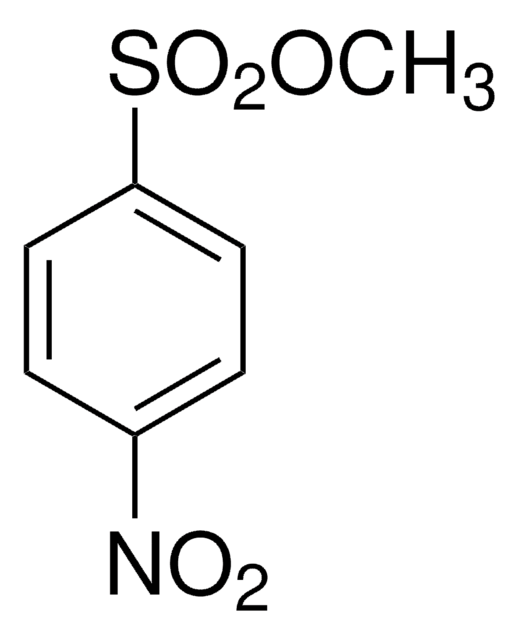653152
4-Mercaptophenylacetic acid
97%
Sinónimos:
(4-Carboxymethyl)thiophenol, (4-Sulfanylphenyl)acetic acid, 2-(4-Mercaptophenyl)acetic acid, 2-(4-Sulfanylphenyl)acetic acid, 4-Mercaptobenzeneacetic acid, p-Mercaptophenylacetic acid
About This Item
Productos recomendados
assay
97%
form
solid
mp
105-109 °C (lit.)
functional group
carboxylic acid
storage temp.
2-8°C
SMILES string
OC(=O)Cc1ccc(S)cc1
InChI
1S/C8H8O2S/c9-8(10)5-6-1-3-7(11)4-2-6/h1-4,11H,5H2,(H,9,10)
InChI key
ORXSLDYRYTVAPC-UHFFFAOYSA-N
General description
Application
It can be used:
- On-resin preparation of peptide-α thiophenylesters which are used in a chemical ligation process for the chemical synthesis of peptides.
- In one pot deprotection of (acetamido-methyl)cysteine following native chemical ligation and/or desulfurization method for the preparation of peptides.
- Palladium facilitated deprotection of N-terminal cysteine through native chemical ligation method for the preparation of synthetically challenging proteins.
signalword
Danger
hcodes
Hazard Classifications
Eye Dam. 1 - Skin Irrit. 2 - STOT SE 3
target_organs
Respiratory system
Storage Class
11 - Combustible Solids
wgk_germany
WGK 3
flash_point_f
Not applicable
flash_point_c
Not applicable
ppe
dust mask type N95 (US), Eyeshields, Gloves
Elija entre una de las versiones más recientes:
¿Ya tiene este producto?
Encuentre la documentación para los productos que ha comprado recientemente en la Biblioteca de documentos.
Los clientes también vieron
Nuestro equipo de científicos tiene experiencia en todas las áreas de investigación: Ciencias de la vida, Ciencia de los materiales, Síntesis química, Cromatografía, Analítica y muchas otras.
Póngase en contacto con el Servicio técnico

![[Pd(OAc)2]3 reagent grade, 98%](/deepweb/assets/sigmaaldrich/product/structures/508/249/99a0ef2c-b77c-4d73-8ed9-0cca05b6b41f/640/99a0ef2c-b77c-4d73-8ed9-0cca05b6b41f.png)


![(Ir[dF(CF3)ppy]2(dtbpy))PF6](/deepweb/assets/sigmaaldrich/product/structures/982/913/02dd8ddd-6deb-40a0-ab9b-07b18f1abb09/640/02dd8ddd-6deb-40a0-ab9b-07b18f1abb09.png)








